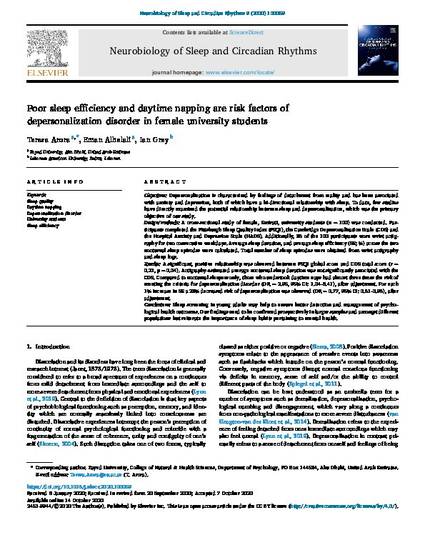
© 2020 The Author(s) Objectives: Depersonalization is characterized by feelings of detachment from reality and has been associated with anxiety and depression, both of which have a bi-directional relationship with sleep. To date, few studies have directly examined the potential relationship between sleep and depersonalization, which was the primary objective of our study. Design/methods: A cross-sectional study of female, Emirati, university students (n = 100) was conducted. Participants completed the Pittsburgh Sleep Quality Index (PSQI), the Cambridge Depersonalization Scale (CDS) and the Hospital Anxiety and Depression Scale (HADS). Additionally, 36 of the 100 participants wore wrist actigraphy for two consecutive weekdays. Average sleep duration, and average sleep efficiency (SE; %) across the two nocturnal sleep episodes were calculated. Total number of sleep episodes were obtained from wrist actigraphy and sleep logs. Results: A significant, positive relationship was observed between PSQI global score and CDS total score (r = 0.21, p = 0.04). Actigraphy-estimated average nocturnal sleep duration was not significantly associated with the CDS. Compared to nocturnal sleepers only, those who undertook daytime naps had almost three times the risk of meeting the criteria for depersonalization disorder (OR = 2.95, 95% CI: 1.04–8.41), after adjustment. For each 1% increase in SE a 23% decreased risk of depersonalization was observed (OR = 0.77, 95% CI: 0.61–0.96), after adjustment. Conclusions: Sleep screening in young adults may help to ensure better detection and management of psychological health outcomes. Our findings need to be confirmed prospectively in larger samples and amongst different populations but reiterate the importance of sleep habits pertaining to mental health.
- Daytime napping,
- Depersonalization disorder,
- Sleep efficiency,
- Sleep quality,
- University students
Available at: http://works.bepress.com/teresa-arora/20/